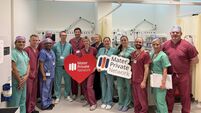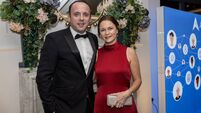My Career: Dreaming of a career in science? Go for it!

Han Shao Diversity, of the Tyndall, on Diversity Day. Picture Clare Keogh
Name: Han Shao
Age: 33
Lives: Cork city
Job title: Researcher in Sensor Development at Tyndall National Institute, based at UCC.
Education background: PhD in Chemistry, UCC.
Hobbies: Handcrafts, playing keyboard, singing, gaming.
Describe your job in five words: Energetic, meaningful, challenging, fulfilling, worthwhile.
Describe yourself in five words: Passionate, positive, easy-going, empathic, precise.
Personality needed for this kind of work? Reliable, determined, resilient.
How long are you doing this job? Four years as a PhD student, another four years and a bit as researcher.
How did you get this job? Sometimes I feel very lucky as I had never considered doing a PhD, but when I was completing my Masters in Tyndall, my supervisor happened to have an open PhD position to develop materials for energy storage devices. I really enjoyed doing the research, so I applied and got the position.
After finishing my PhD, I moved to another group as researcher and I am now working on electrochemical sensors. I think that the opportunities are there for those who are prepared, and have the ability to take them and work hard for them.
Do you need particular qualifications or experience? Yes, a PhD, and a passionate heart.
Describe a day at work: I am a researcher, as well as a chemistry lab manager, so I do a lot of lab work. I supervise and mentor students and interns, as well as some admin work within the group.
Additionally, not every day, but over the course of the year, I need to write proposals, undertake training, build up my network, organise and/or attend conferences, project meetings, and education and public engagement events.
I also volunteer as a member of Tyndall’s Equality, Diversity, and Inclusion (EDI) Team. This is committed to working towards equality of opportunity for all. Tyndall is home to over 600 staff and students from over 50 countries, creating an engaging, multi-cultural and diverse working environment. I help organise the many EDI events and information sessions that take place throughout the year.

How many hours do you work a week? 35-ish.
What do you wear to work? It depends, if I am going to be in the lab, then I need to be fully covered, so I wear normal tops and trousers plus a lab coat, however, I love skirts and dresses along with high heels as well. During events, like the annual Tyndall Culture Day, employees are encouraged to wear their national clothes, so I wear something like Han Chinese Clothing (Han Fu), or Cheongsam (Qi Pao). My colleagues always say I am stylish in general, and I take it as compliment of course.
Is your industry male or female dominated? I suppose male, as we do have more male employees than females in Tyndall. However, Tyndall is in line with Athena Swan, a framework that is used across the globe to support and transform gender equality in higher education and research.
Our EDI Team in Tyndall also does great work in supporting women’s equality in the workplace. We have female leaders, Principal Investigators, etc. in Tyndall, which is fantastic and very encouraging to see.
Does this affect you in any particular way? Not really, especially as mentioned above, Tyndall is making significant strides in addressing the imbalance through Athena Swan and EDI initiatives.
It is very rewarding to be a part of these advancements and to see women in our industry being supported and progressing in their careers.
Is your job stressful? How? Rate it on a scale of 1-10: Sometimes for sure, not always. I suppose it can range from 3-7 (1 is lowest, and 10 is highest). For example, if there are a few deadlines around the same time, or the lab work did not go well for an extended period, it can be quite stressful, but not always.
Do you work with others or on your own? We work as a team. There are nearly 20 people in my group, and there is a research community of 600 staff and students in Tyndall. We work with each other and trust each other in general. For example, in the chemistry lab, we have the lonely working policy, which means it is required to work with someone in the chemistry lab for safety reasons and to ensure that you have support and guidance if needed.
When do you plan to retire or give up working? I have never thought about it, actually. I may never fully retire as I have many things I want to try. Even if I’m not working, I imagine I would be busy all the time. I love doing handcrafts, or maybe I could try painting or something like that. I might become an artist and never retire!
Advice to those who want your job? I would like to say to all girls and young women who have a dream about a career in science, to go for it and never give up.
It is an incredible journey, and you will never be alone.
If someone tells you that you are not capable, just ignore them, because we are together, and we’re all amazing.







 App?
App?




